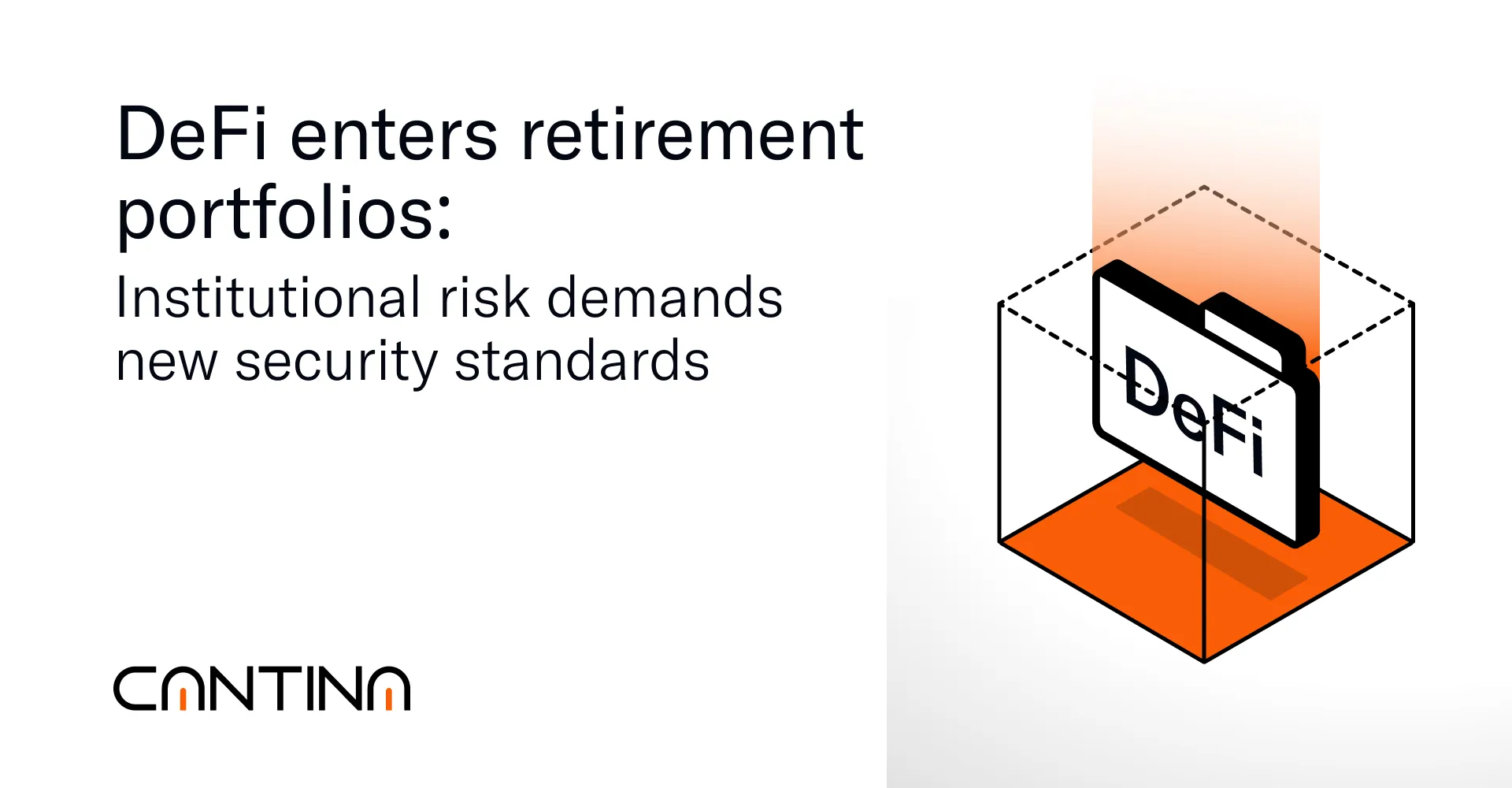On August 7, the U.S. administration issued an executive order that signals a shift in how retirement plans may allocate capital. The directive tasks the Department of Labor and the SEC with reviewing existing ERISA guidelines to expand the range of permitted 401(k) investments. Digital assets, private equity, real estate, infrastructure, and actively managed funds are now being considered as eligible asset classes.
This shift introduces a new layer of complexity. Asset managers, plan sponsors, and financial institutions will need to evaluate whether the protocols behind these assets are equipped to meet institutional security standards.
Cantina is positioned to support this transition. We provide the security infrastructure, maturity assessments, and incident response services required for regulated entities to participate in the digital asset space with clarity and control.
The Executive Order and Its Implications
The order initiates a formal review process. It does not immediately allow crypto into 401(k) plans but it directs regulators to create the frameworks required to support that possibility. This includes rulemaking, risk guidelines, and fiduciary safe harbor protections.
The implications are significant. Retirement capital, long governed by strict compliance and risk thresholds, may soon be directed into protocols that have historically operated outside institutional oversight. This raises important questions about operational maturity, incident readiness, and smart contract reliability.
Protocols seeking inclusion must meet higher thresholds of scrutiny. Institutional partners will not rely on marketing claims or informal assessments. They will require audit histories, verifiable governance models, incident response infrastructure, and third-party evaluations of system resilience.
Risk Management is the Foundation for Institutional Access
Retirement portfolios are risk-managed environments. Any digital asset included in them must demonstrate clear controls across key areas:
Security
Protocols must undergo comprehensive reviews of their smart contracts, infrastructure, and application logic. Informal code reviews are insufficient. Institutions will expect formal security audits with clearly defined scopes and outcomes.
Operational Resilience
Teams must demonstrate structured governance, consistent uptime, tested upgrade paths, and documentation of how key decisions are made and enforced.
Regulatory Alignment
Protocols should understand and anticipate how their operating model intersects with legal and compliance requirements. This includes custody models, KYC/AML policies where applicable, and a documented legal structure.
Incident Command
Institutions will not tolerate long lead times in the event of a breach or failure. Protocols must be able to demonstrate breach triage processes, communication workflows, and post-incident analysis procedures.
Cantina provides services in all four categories. We enable protocols to prepare for institutional review and provide the documentation and analysis required for plan sponsors to make informed, defensible decisions.
A Structured Framework for Assessment
Cantina’s Web3SOC framework provides a clear, tiered evaluation system for DeFi protocols.
The framework evaluates protocols across four core domains:
- Operational structure
- Financial resilience
- Regulatory compliance
- Security posture
Each area is scored and weighted according to its institutional risk profile. Protocols are then placed into maturity tiers that help stakeholders assess exposure. This enables both underwriters and project teams to align expectations and improve their institutional standing through measurable progress.
Institutions benefit from a standard of assessment that matches the diligence models used in traditional finance. Protocols benefit from a path to adoption that is clear, repeatable, and respected by stakeholders.
Cantina’s Role in Supporting Institutional Capital Allocation
Cantina enables protocols to meet institutional risk requirements through a combination of technical services and structured assessments.
We provide:
- Security audits for smart contracts, application logic, and infrastructure
- Incident response planning and breach support
- Maturity assessment through the Web3SOC framework
- Custom risk frameworks aligned with institutional evaluation models
These services are designed to support long-term adoption. Our team works with protocols, funds, and enterprise stakeholders to reduce security risk, prepare for post-incident recovery, and align internal controls with the expectations of regulated capital.
Preparing for a New Capital Environment
The executive order introduces a regulatory shift. As alternative assets move closer to retirement portfolios, the burden of proof will increase. Protocols that cannot demonstrate institutional-grade security and operational resilience will be excluded from consideration.
Cantina helps protocols close that gap. We provide the reviews, systems, and assurance required to operate within high-trust, high-scrutiny environments. Our goal is to support growth by removing risk, increasing transparency, and enabling defensible participation in regulated markets.
Request An Assessment
Institutional adoption begins with clear evaluation. Talk to our team today to understand your current security posture and standing.




